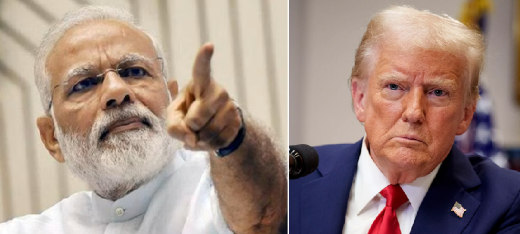
India Rejects Trump Claim on Brokering Ceasefire with Pakistan and has firmly denied former U.S. President Donald Trump's claim that he brokered a ceasefire between India and Pakistan
India Rejects Trump Claim – Former U.S. President Donald Trump has made headlines with his assertion that he successfully brokered a ceasefire between India and Pakistan during escalating tensions. However, India has categorically rejected the claim, stating that no foreign intervention played a role in the ceasefire arrangement between the two South Asian neighbors.
Trump claimed that he leveraged trade negotiations to convince both sides to halt military actions—a statement quickly refuted by India’s Ministry of External Affairs (MEA). Indian officials stressed that the ceasefire was reached through direct talks between the Directors General of Military Operations (DGMOs) of both countries, without any U.S. mediation.
Trump’s Claim: U.S. Negotiated Ceasefire Using Trade Incentives
Speaking at a rally in North Carolina, Trump stated:
“It was my administration that got India and Pakistan to put down their weapons. We worked out a smart trade deal that convinced them to come to the table and stop the war.”
According to Trump, his team allegedly negotiated economic incentives that led to both nations agreeing to a ceasefire. He further claimed that his intervention prevented a nuclear escalation.
India’s Official Rejection of Trump’s Statement
Shortly after Trump’s remarks, India’s Ministry of External Affairs (MEA) issued a strong rebuttal, stating:
- “India did not engage in any U.S.-brokered ceasefire talks.”
- “The ceasefire agreement was reached solely through bilateral negotiations.”
- “Trade discussions had no relevance in military de-escalation.”
MEA spokesperson Randhir Jaiswal reaffirmed that India’s military decisions are independent and that any territorial or security matters regarding Pakistan will only be handled bilaterally.
Pakistan’s Response to Trump’s Claim
Interestingly, Pakistan’s leadership welcomed Trump’s statement, with Prime Minister Shehbaz Sharif expressing appreciation for what he called “historic efforts to bring stability to South Asia.”
While Pakistan has not officially confirmed U.S. involvement in past ceasefire talks, Sharif’s praise of Trump suggests that Islamabad may be using the claim to highlight external diplomatic influence.
Geopolitical Implications of Trump’s Statement
Trump’s ceasefire claim has sparked debate in diplomatic circles, raising questions about:
- U.S. involvement in South Asian conflicts – India’s firm rejection highlights its resistance to foreign interference, reinforcing its stance that Kashmir and military relations with Pakistan are purely bilateral matters.
- Pakistan’s endorsement of Trump’s role – Islamabad’s positive response suggests an attempt to validate external mediation, potentially to gain international support.
- Trade diplomacy versus military strategy – Experts argue that Trump’s assertion that economic deals shaped military decisions is inaccurate, as India has always maintained strategic autonomy in defense matters.
Conclusion – India Rejects Trump Claim
India’s outright rejection of Trump’s claim underscores its commitment to sovereignty and independent defense strategy. While Pakistan has welcomed the claim, India remains firm in its stance against external intervention in its military affairs.
1 thought on “India Rejects Trump Claim on Brokering Ceasefire with Pakistan”